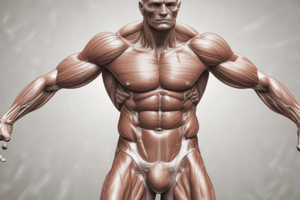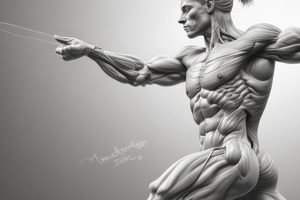Podcast
Questions and Answers
Which type of muscle is characterized as non-fatiguing and involuntary?
Which type of muscle is characterized as non-fatiguing and involuntary?
- Striated
- Smooth
- Cardiac (correct)
- Skeletal
Which of the following is NOT a major skeletal muscle?
Which of the following is NOT a major skeletal muscle?
- Biceps
- Deltoids
- Lunges (correct)
- Pectorals
What is the role of an antagonist muscle during movement?
What is the role of an antagonist muscle during movement?
- To counteract the agonist (correct)
- To assist the agonist
- To prevent muscle fatigue
- To provide support
Which type of muscle contraction occurs when a muscle lengthens while under tension?
Which type of muscle contraction occurs when a muscle lengthens while under tension?
Which muscle fiber type is known for its resistance to fatigue and is primarily used during endurance activities?
Which muscle fiber type is known for its resistance to fatigue and is primarily used during endurance activities?
Which type of muscle is consciously controlled and can fatigue during exercise?
Which type of muscle is consciously controlled and can fatigue during exercise?
What is one of the immediate responses of the muscular system to a single exercise session?
What is one of the immediate responses of the muscular system to a single exercise session?
Where is cardiac muscle primarily found?
Where is cardiac muscle primarily found?
What is a characteristic of smooth muscle?
What is a characteristic of smooth muscle?
Which adaptation occurs as a long-term response to regular resistance training?
Which adaptation occurs as a long-term response to regular resistance training?
Which of the following is an example of a skeletal muscle?
Which of the following is an example of a skeletal muscle?
What is a common effect of aging on the muscular system?
What is a common effect of aging on the muscular system?
Which type of muscle does not fatigue and is found only in the heart?
Which type of muscle does not fatigue and is found only in the heart?
Which of the following adaptations increases the storage capacity for energy in the muscles?
Which of the following adaptations increases the storage capacity for energy in the muscles?
What physiological change accompanies high-intensity exercise?
What physiological change accompanies high-intensity exercise?
Flashcards
Synergists
Synergists
Muscles that work together to perform a movement. They assist the prime mover (agonist) in its action.
Concentric Contraction
Concentric Contraction
The type of muscle contraction that occurs when the muscle shortens and creates movement. Examples include lifting a weight or jumping.
Eccentric Contraction
Eccentric Contraction
The type of muscle contraction that occurs when the muscle lengthens under tension. Examples include lowering a weight slowly or walking downstairs.
Smooth Muscles
Smooth Muscles
Signup and view all the flashcards
Cardiac Muscle
Cardiac Muscle
Signup and view all the flashcards
What are skeletal muscles?
What are skeletal muscles?
Signup and view all the flashcards
What are cardiac muscles?
What are cardiac muscles?
Signup and view all the flashcards
What are smooth muscles?
What are smooth muscles?
Signup and view all the flashcards
What is a concentric contraction?
What is a concentric contraction?
Signup and view all the flashcards
What is an eccentric contraction?
What is an eccentric contraction?
Signup and view all the flashcards
Hypertrophy
Hypertrophy
Signup and view all the flashcards
Cramp
Cramp
Signup and view all the flashcards
Increased tolerance to lactate
Increased tolerance to lactate
Signup and view all the flashcards
Microtears
Microtears
Signup and view all the flashcards
Myoglobin
Myoglobin
Signup and view all the flashcards




